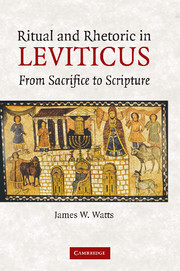Book contents
- Frontmatter
- Contents
- Abbreviations
- Preface
- Ritual and rhetoric in Leviticus
- 1 Introduction: Ritual Text and Ritual Interpretation
- 2 The Rhetoric of Ritual Instruction
- 3 The Rhetoric of Burnt Offerings
- 4 The Rhetoric of Sin, Guilt, and Ritual Offerings
- 5 The Rhetoric of Ritual Narrative
- 6 The Rhetoric of Atonement
- 7 The Rhetoric of Priesthood
- 8 The Rhetoric of Sacrifice
- 9 The Rhetoric of Scripture
- Bibliography
- Index of Biblical Citations
- Index of Other Ancient Literature
- Index of Authors
- Index of Subjects
4 - The Rhetoric of Sin, Guilt, and Ritual Offerings
Published online by Cambridge University Press: 22 July 2009
- Frontmatter
- Contents
- Abbreviations
- Preface
- Ritual and rhetoric in Leviticus
- 1 Introduction: Ritual Text and Ritual Interpretation
- 2 The Rhetoric of Ritual Instruction
- 3 The Rhetoric of Burnt Offerings
- 4 The Rhetoric of Sin, Guilt, and Ritual Offerings
- 5 The Rhetoric of Ritual Narrative
- 6 The Rhetoric of Atonement
- 7 The Rhetoric of Priesthood
- 8 The Rhetoric of Sacrifice
- 9 The Rhetoric of Scripture
- Bibliography
- Index of Biblical Citations
- Index of Other Ancient Literature
- Index of Authors
- Index of Subjects
Summary
Contemporary scholarship on Leviticus 4–5 operates under the shadow of an especially contentious history of interpretation. Early Christian rhetoric depicted the ḥaṭṭāʾt and ʾāšām offerings of Leviticus 4–5 as paradigms of Israel's whole system of worship. The Septuagint, following Hebrew usage, had translated the names of the offerings with common Greek nouns for “sin” (hamartia) and “guilt, offense” (plēmmeleia/plēmmelēma). On that basis, Christian interpreters regarded atonement for sin and guilt as the essential goal of all Jewish offerings. They also judged them to have failed to achieve complete atonement, which they argued became available only through Jesus' self-sacrifice (e.g., Heb 9:22, 10:1–18).
The rise of critical biblical scholarship gave a historical twist to this thesis. Nineteenth-century scholars such as Julius Wellhausen and William Robertson Smith argued that the concern with sin and guilt represented by the ḥaṭṭāʾt and ʾāšām offerings was paradigmatic only of exilic and post-exilic Jewish thought and practice (though Wellhausen thought this trend began with the seventh century b.c.e. reforms of Josiah and the book of Deuteronomy). The older cultic worship emphasized celebratory meals in the presence of the national god (a practice not too dissimilar from Protestant celebrations of Communion). They maintained, however, that this tradition degenerated into a theocratic focus on sin and guilt, due to the disastrous national histories of Israel and Judah in the eighth through the fifth centuries and the centralization of power in the hands of the priestly hierarchy.
- Type
- Chapter
- Information
- Ritual and Rhetoric in LeviticusFrom Sacrifice to Scripture, pp. 79 - 96Publisher: Cambridge University PressPrint publication year: 2007



